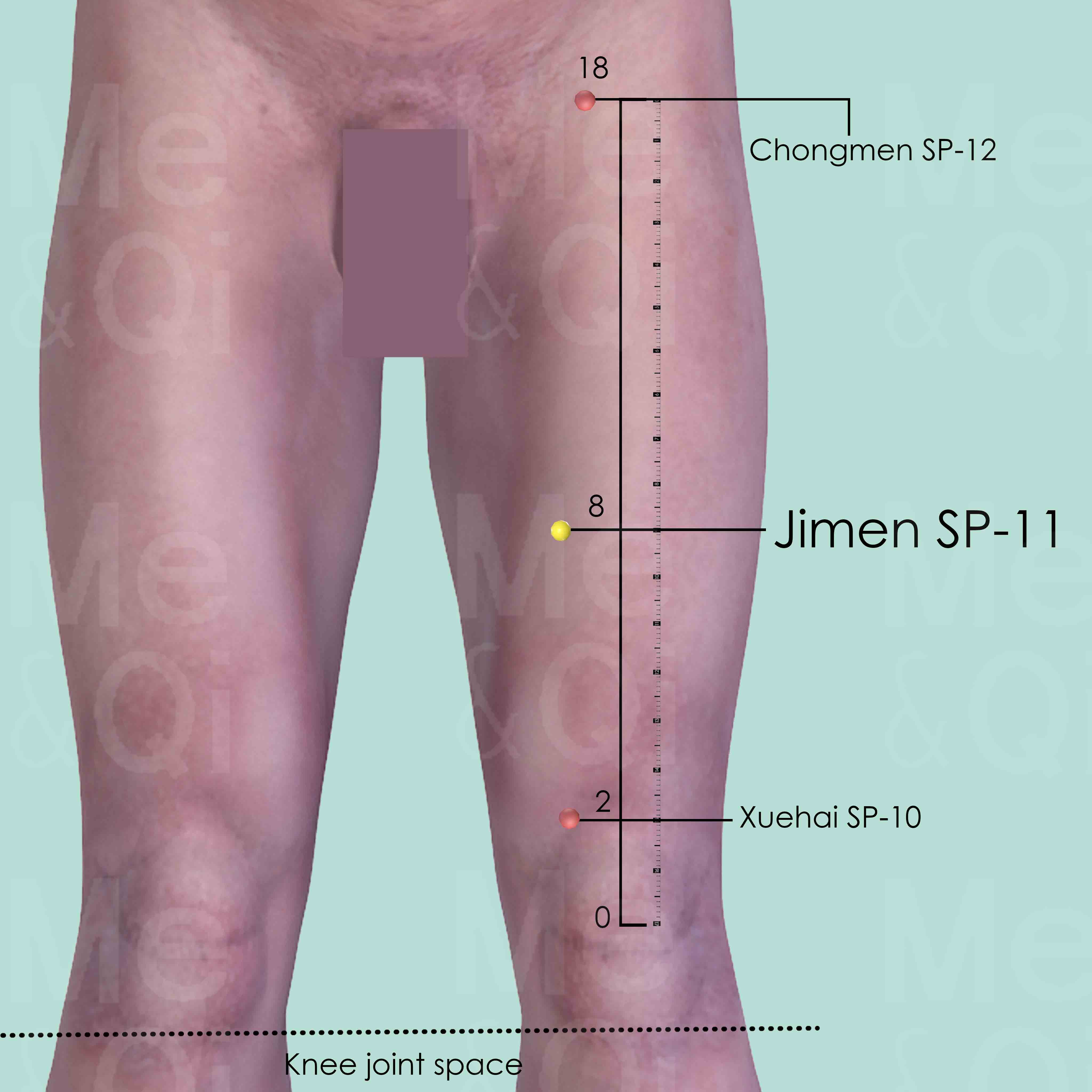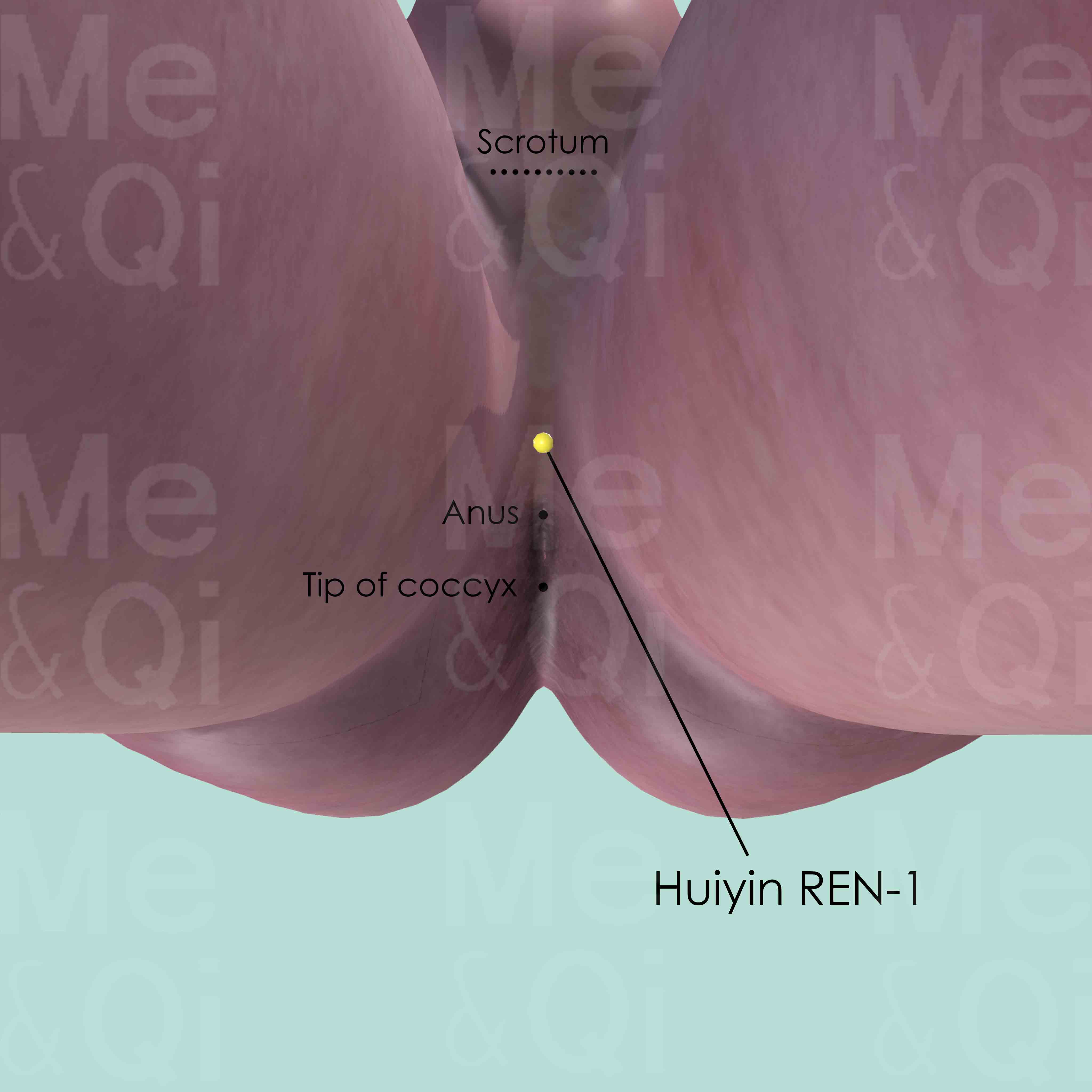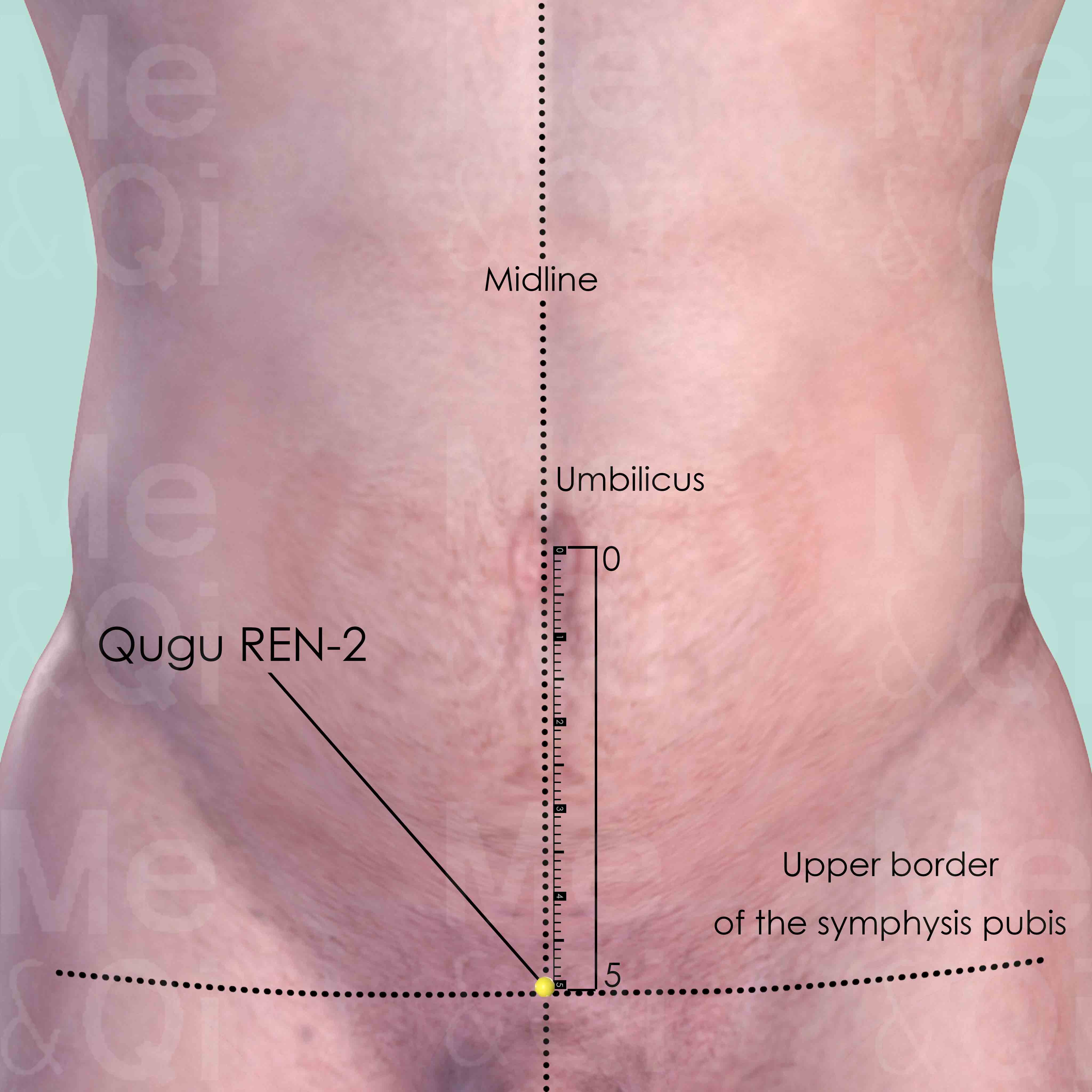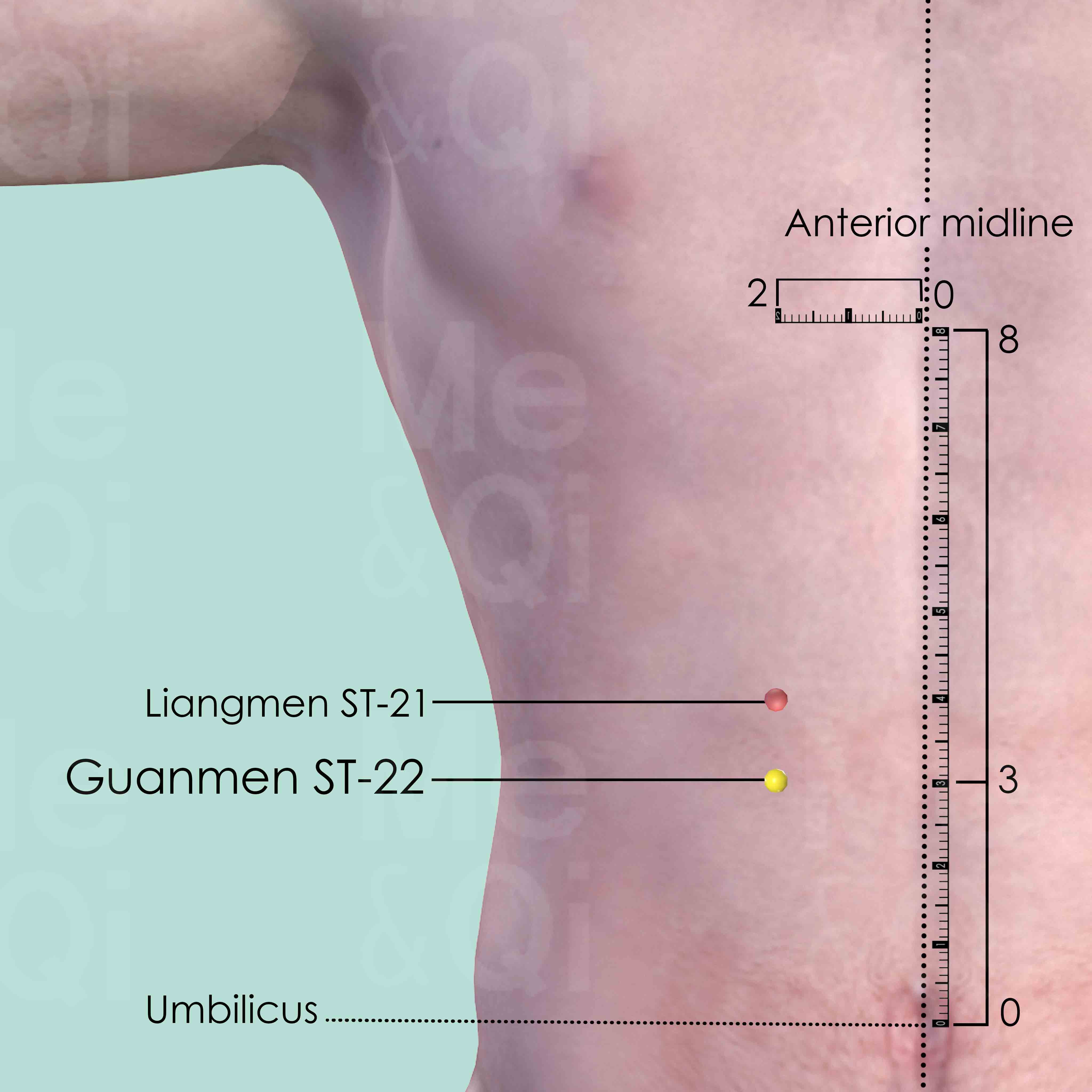Enuresisaccording to TCM
Symptom family: Urinary Incontinence and Dysfunction
Sub-symptom(s): Pediatric Nocturnal Enuresis
What is Enuresis?
Enuresis, commonly known as bedwetting, is the involuntary discharge of urine, often occurring at night during sleep. This condition, particularly distressing in children and adolescents, is classified as pediatric nocturnal enuresis when it pertains to nighttime incidents in the pediatric population.
How does TCM view Enuresis?
Traditional Chinese Medicine (TCM) perceives enuresis as a manifestation of an underlying imbalance within the body's vital energies. TCM emphasizes that symptoms are caused by different patterns of disharmony, making it crucial to identify the correct pattern for effective treatment.
Root Causes of Enuresis in TCM
In TCM, enuresis may arise from multiple causes. Qi Deficiency, particularly of the Bladder and Kidneys, often leads to an inability to control urination. A person with a pale complexion, low energy, and frequent, pale urination may be experiencing Bladder Deficient and Empty Cold, signaling a need for warming and Qi-strengthening treatments.
Alternatively, Kidney Qi not Firm could present with similar urinary symptoms, accompanied by lower back pain and a feeling of cold, indicating a deeper Deficiency that requires nourishing the Kidney's Yang energy.
Explore below more details about what might cause Enuresis according to TCM.
- By Syndrome
- By Organ
- Qi Deficiency
- Cold
- Bladder
- Kidney
Qi Deficiency
Qi Deficiency in TCM is like running low on battery power. Qi is the vital energy that powers every function in your body. When there's a Qi Deficiency, it means your body doesn't have enough of this essential energy. This can make you feel tired all the time, weak, or even cause shortness of breath. It's similar to how you feel when you haven't had enough sleep or nutritious food. Your body just doesn't have the energy it needs to perform at its best. Unlike modern medicine, which often focuses on specific physical causes for fatigue and weakness, TCM views Qi Deficiency as an overall energy depletion that affects your entire well-being, and it seeks to replenish and balance this vital energy.... see more
Qi Deficiency Patterns That Can Lead to Enuresis
| Pattern Name | Relevant Symptoms | Relevant Formulas |
|---|---|---|
| Kidney Qi not Firm | Enuresis, Lower back pain, Lower back weakness, Polyuria, Weak urine stream, Nocturnal emission, Generalized fatigue, Chills, Cold extremities, White vaginal discharge, Bearing down sensation in abdomen, Recurrent miscarriage... see more | You Gui Wan | Jin Suo Gu Jing Wan | Fu Tu Dan | Qing E Wan | Tu Si Zi Wan |
Cold
In TCM "Cold" as a pattern of disharmony refers to a specific type of imbalance within the body's systems, often linked to a deficiency or weakness. It's not about feeling physically cold or having a common cold, but rather a metaphorical description of certain symptoms and underlying conditions. When a TCM practitioner says someone suffers from "Cold," it usually implies that the body's Yang energy, which is warm and active, is insufficient or overpowered by Yin energy, which is cool and passive. Symptoms of Cold in TCM can include a general feeling of coldness, cold limbs, pale complexion, low energy, slow metabolism, and a preference for warmth. ... see more
Cold Patterns That Can Lead to Enuresis
| Pattern Name | Relevant Symptoms | Relevant Formulas |
|---|---|---|
| Bladder Deficient and Cold | Enuresis, Frequent urination, Pale and abudant urination, Urinary or fecal incontinence, Lower back pain, Dizziness, Nocturia, White urethral discharge, Chills... see more | Sang Piao Xiao San | Suo Quan Wan |
Bladder
In TCM the Bladder plays a crucial role beyond its basic function of storing and excreting urine. It is intimately connected with the Kidney system, helping to regulate the body's water balance and being a key component in the processing and elimination of fluids. The Bladder also influences the lower part of the body and the back. When it malfunctions or is imbalanced in TCM, it can lead to urinary issues like frequent urination, incontinence, or painful urination. Additionally, there may be problems related to its meridian pathway, such as lower back pain, stiffness, or weakness in the legs. The Bladder’s condition in TCM can also reflect emotional states, with imbalances potentially leading to feelings of fear or anxiety.... see more
Bladder Patterns That Can Lead to Enuresis
| Pattern Name | Relevant Symptoms | Relevant Formulas |
|---|---|---|
| Bladder Deficient and Cold | Enuresis, Frequent urination, Pale and abudant urination, Urinary or fecal incontinence, Lower back pain, Dizziness, Nocturia, White urethral discharge, Chills... see more | Sang Piao Xiao San | Suo Quan Wan |
Kidney
In TCM the Kidneys are regarded as the body's most fundamental reservoir of Essence, known as Jing, which influences growth, reproduction, and aging. They are not just organs for filtering blood, but a holistic system governing vital life forces. When the Kidneys malfunction in TCM, it can manifest as a variety of health issues, such as chronic fatigue, reproductive problems, imbalances in fluid metabolism leading to edema or dryness, lower back pain, and a sense of fear or insecurity.... see more
Kidney Patterns That Can Lead to Enuresis
| Pattern Name | Relevant Symptoms | Relevant Formulas |
|---|---|---|
| Kidney Qi not Firm | Enuresis, Lower back pain, Lower back weakness, Polyuria, Weak urine stream, Nocturnal emission, Generalized fatigue, Chills, Cold extremities, White vaginal discharge, Bearing down sensation in abdomen, Recurrent miscarriage... see more | You Gui Wan | Jin Suo Gu Jing Wan | Fu Tu Dan | Qing E Wan | Tu Si Zi Wan |
TCM Herbal Formulas for Enuresis
The selection of TCM formulas and herbs is contingent upon the individual's specific pattern. For Bladder Deficient and Empty Cold, Sang Piao Xiao San, which includes Praying Mantis Egg-Cases, might be employed to stabilize and warm the Bladder.
Kidney Qi not Firm may be addressed with You Gui Wan, featuring Prepared aconite to bolster the Kidney's Yang energy and help restore proper urinary function.
Explore below some TCM herbal formulas used to address enuresis, organized by cause and by formula type.
- By Cause
- By Formula Type
- Qi Deficiency
- Cold
- Formulas that secure essence and stop enuresis
- Formulas that warm yang and tonify
- Formulas that tonify qi
- Formulas that purge heat accumulation
- Formulas that warm interior cold
- Formulas that tonify yin and yang
- Formulas that tonify blood
- Formulas that harmonize liver-Spleen
- Formulas that clear wind-Cold
Top Formula for Qi Deficiency:
You Gui Wan
Suitable for Qi Deficiency patterns that may cause enuresis, such as Kidney Qi not Firm
Learn moreAll Formulas Recommended for Enuresis Caused by Qi Deficiency
| Formula | Patterns Suitable For |
|---|---|
| You Gui Wan | Kidney Qi not Firm |
| Jin Suo Gu Jing Wan | Kidney Qi not Firm |
| Fu Tu Dan | Kidney Qi not Firm |
| Qing E Wan | Kidney Qi not Firm |
| Tu Si Zi Wan | Kidney Qi not Firm |
Top Formula for Cold:
Sang Piao Xiao San
Suitable for Cold patterns that may cause enuresis, such as Bladder Deficient and Cold
Learn moreAll Formulas Recommended for Enuresis Caused by Cold
| Formula | Patterns Suitable For |
|---|---|
| Sang Piao Xiao San | Bladder Deficient and Cold |
| Suo Quan Wan | Bladder Deficient and Cold |
Formulas that secure Essence and stop enuresis
These formulas are suitable for some enuresis-causing patterns like Bladder Deficient and Cold.
One such formula is Sang Piao Xiao San, with praying mantis egg-Case as a key herb.
Other formulas of this category are listed in the table below.
All "formulas that secure essence and stop enuresis" recommended for enuresis
| Formula | Patterns Suitable For (if applicable) |
|---|---|
| Sang Piao Xiao San | Bladder Deficient and Cold |
| Suo Quan Wan | Bladder Deficient and Cold |
| Jin Suo Gu Jing Wan | Kidney Qi not Firm |
| Fu Tu Dan | Kidney Qi not Firm |
Formulas that warm Yang and tonify
These formulas are suitable for some enuresis-causing patterns like Kidney Qi not Firm.
One such formula is You Gui Wan, with prepared aconite as a key herb.
Other formulas of this category are listed in the table below.
All "formulas that warm yang and tonify" recommended for enuresis
| Formula | Patterns Suitable For (if applicable) |
|---|---|
| You Gui Wan | Kidney Qi not Firm |
| Qing E Wan | Kidney Qi not Firm |
| Tu Si Zi Wan | Kidney Qi not Firm |
Formulas that tonify Qi
Enuresis can be treated by these formulas if it results from Qi deficiency, necessitating treatments that boost the body's vital energy.
One such formula is Bu Fei Tang, with ginseng as a key herb.
Formulas that purge Heat accumulation
Enuresis can be treated by these formulas if it arises from an excess of internal heat, needing actions that clear heat and reduce its intensity.
One such formula is Da Cheng Qi Tang, with rhubarb as a key herb.
Formulas that warm Interior Cold
Enuresis can be treated by these formulas when it is caused by an internal cold condition, needing treatments that warm the body's interior.
One such formula is Gan Cao Gan Jiang Tang, with dried ginger as a key herb.
Formulas that tonify Yin and Yang
Enuresis can be treated by these formulas if it stems from a deficiency in both Yin and Yang energies, necessitating a balanced approach to tonification.
One such formula is Gui Zhi Jia Long Gu Mu Li Tang, with cinnamon bark as a key herb.
Formulas that tonify Blood
Enuresis can be treated by these formulas when it is due to blood deficiency, requiring blood-nourishing and enriching actions.
One such formula is Shao Yao Gan Cao Tang, with white peony root as a key herb.
Formulas that harmonize Liver-Spleen
Enuresis can be treated by these formulas when there's an imbalance between the Liver and Spleen systems, often manifesting as digestive disturbances and emotional fluctuations.
One such formula is Si Ni San, with bupleurum root as a key herb.
Formulas that clear Wind-Cold
Enuresis can be treated by these formulas when it stems from external pathogenic influences characterized by cold and wind symptoms.
One such formula is Xiao Qing Long Tang, with ephedra as a key herb.
Acupoints for Enuresis
TCM also utilizes acupoint stimulation to treat enuresis. Points such as Ciliao BL-32 and Shenshu BL-23 on the Bladder Channel are often selected for their capacity to regulate the Lower Burner and fortify Kidney essence. Sanyinjiao SP-6, located on the Spleen Channel, is another pivotal point known for its effectiveness in strengthening the Spleen and Kidney, thereby improving urinary function. These points, among others, are integral to a comprehensive TCM approach to managing enuresis.
Explore below some acupoints used to address enuresis, organized by meridian.
- By Meridian
- Bladder Channel
- Spleen Channel
- Heart Channel
- Liver Channel
- Directing Vessel
- Lung Channel
- Stomach Channel
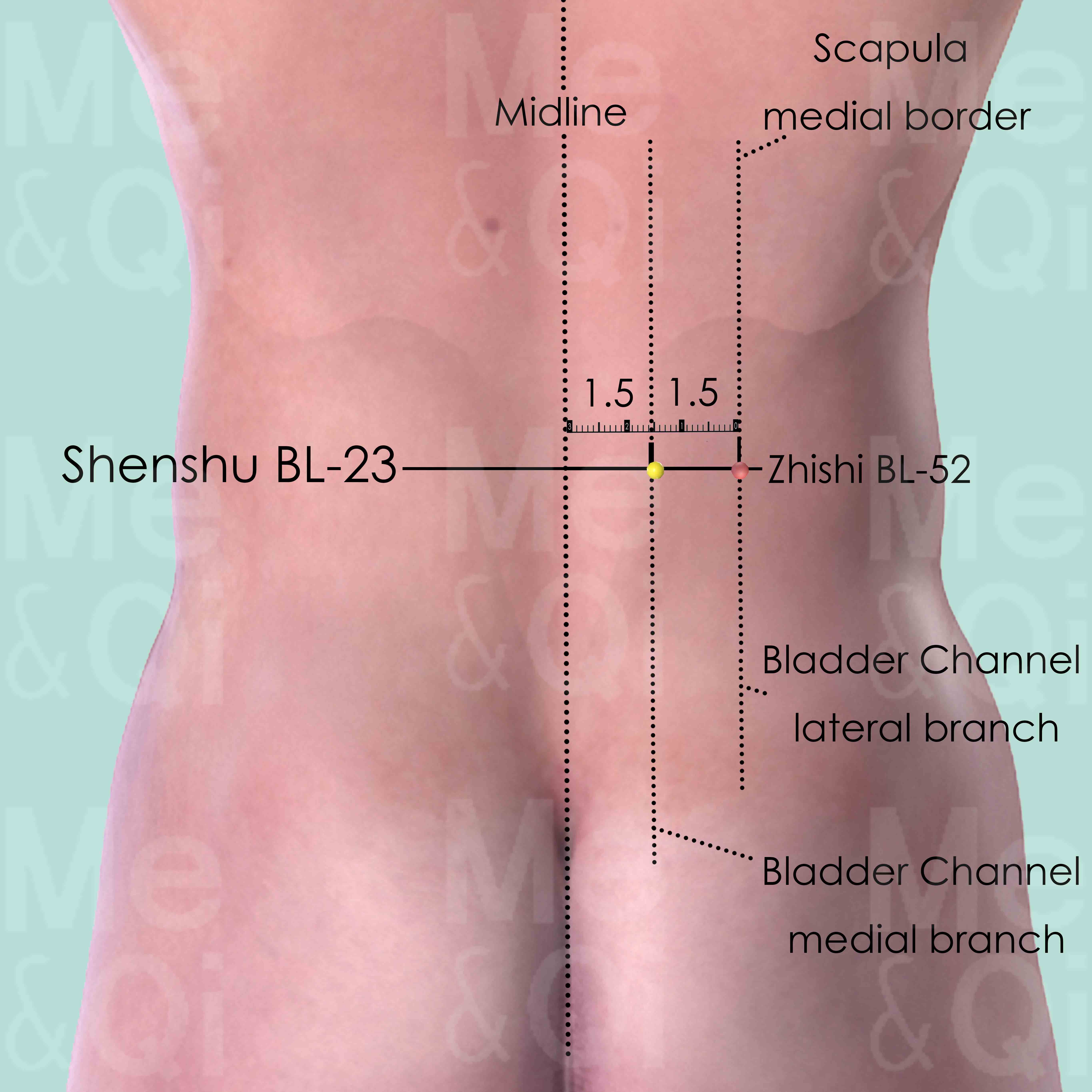
Shenshu BL-23
1.5 cun lateral to the lower border of the spinous process of the 2nd lumber vertebra (L2).
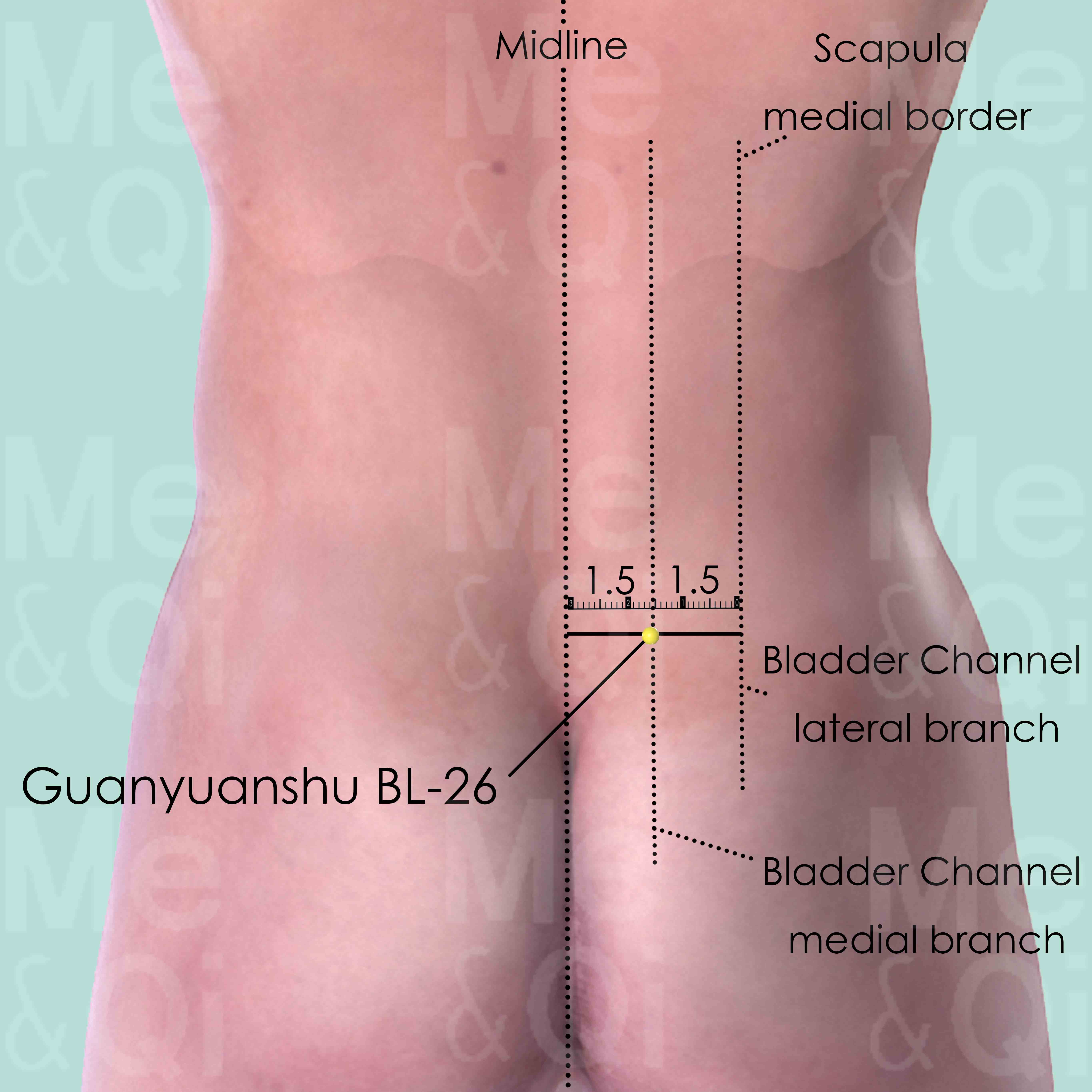
Guanyuanshu BL-26
1.5 cun lateral to the lower border of the spinous process of the 5th lumber vertebra (L5).
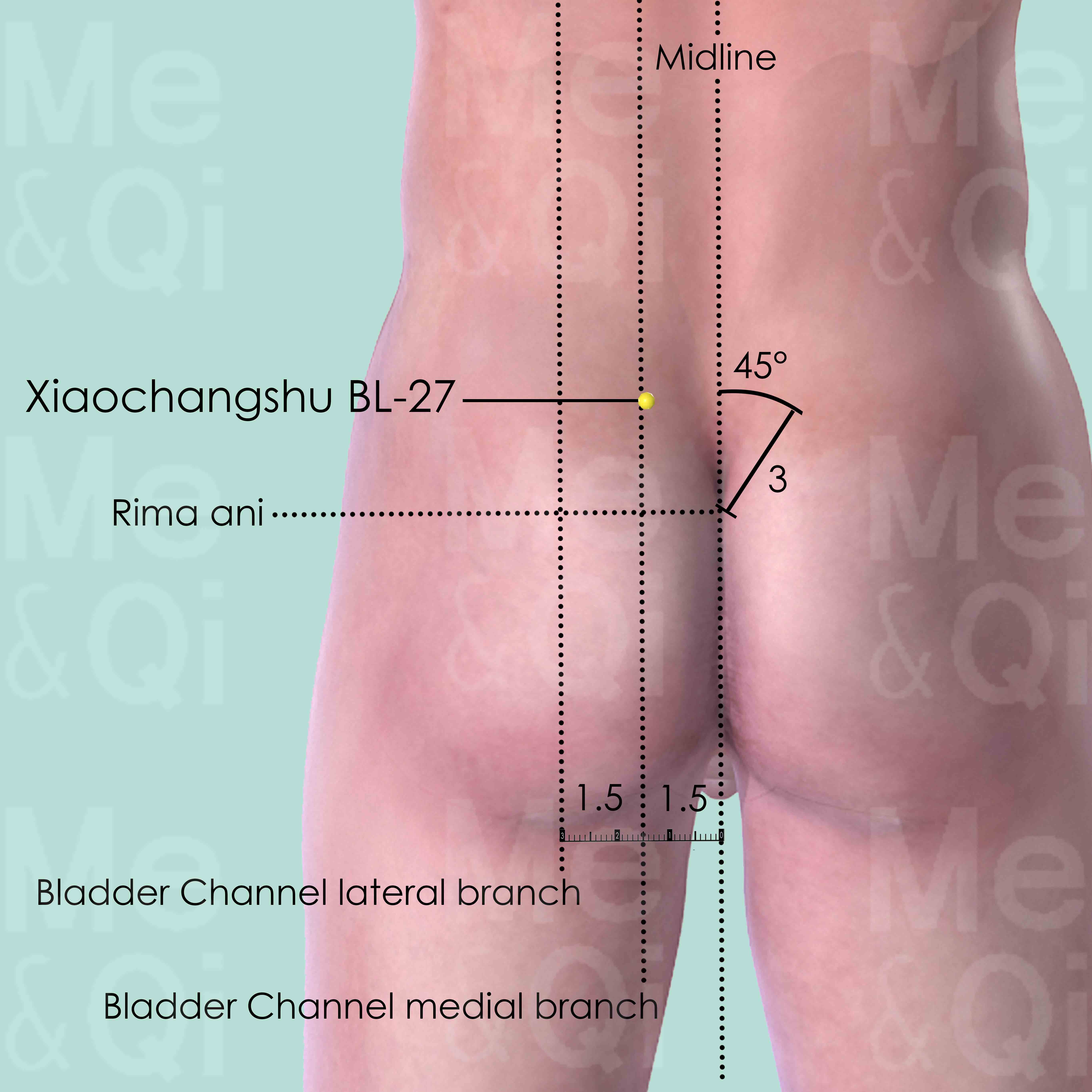
Xiaochangshu BL-27
At the level of the 1st posterior sacral foramen, 1.5 cun lateral to the posterior midline.
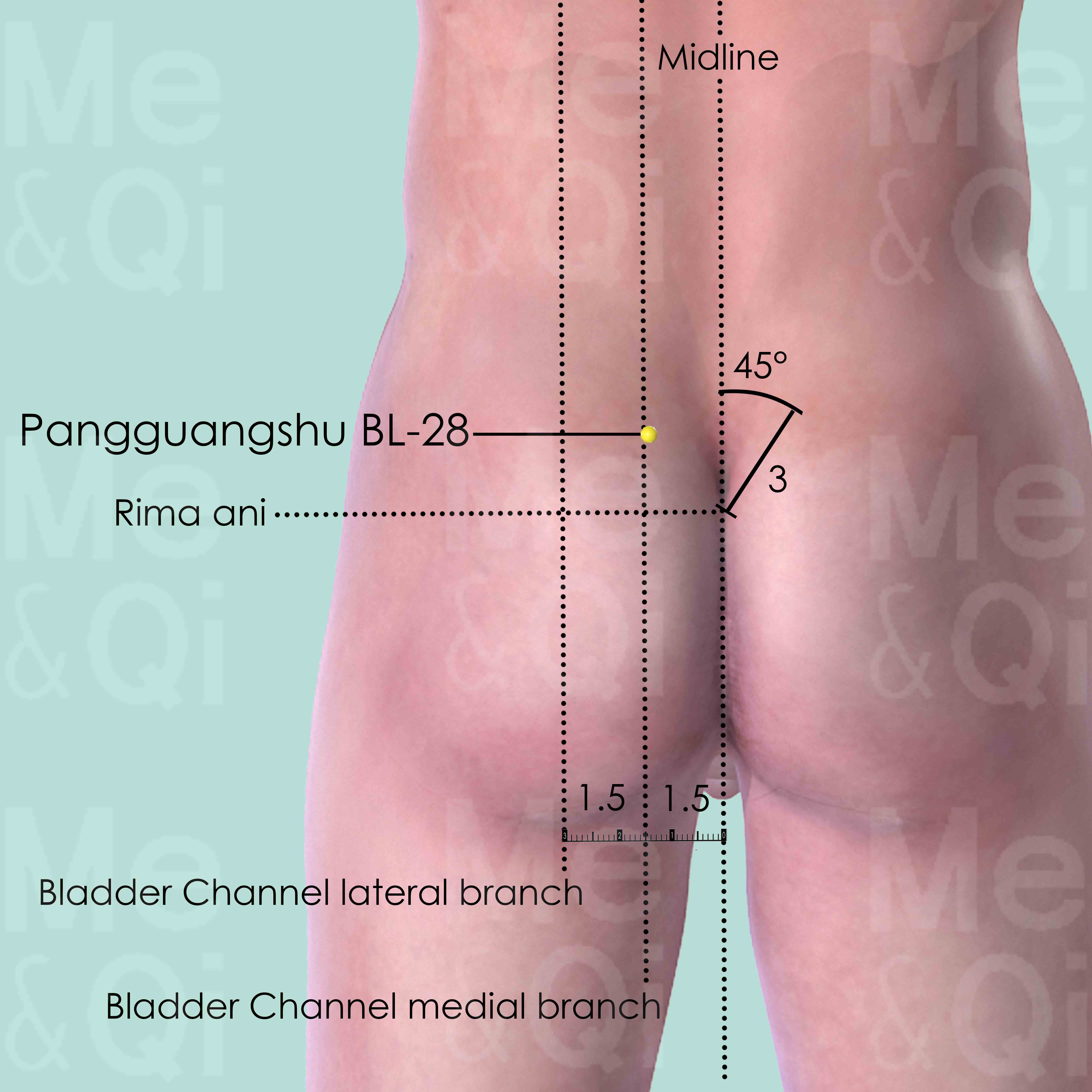
Pangguangshu BL-28
At the level of the 2nd posterior sacral foramen, 1.5 cun lateral to the posterior midline, in the depression between the medial border of the posterior superior iliac spine (PSIS) and the sacrum.
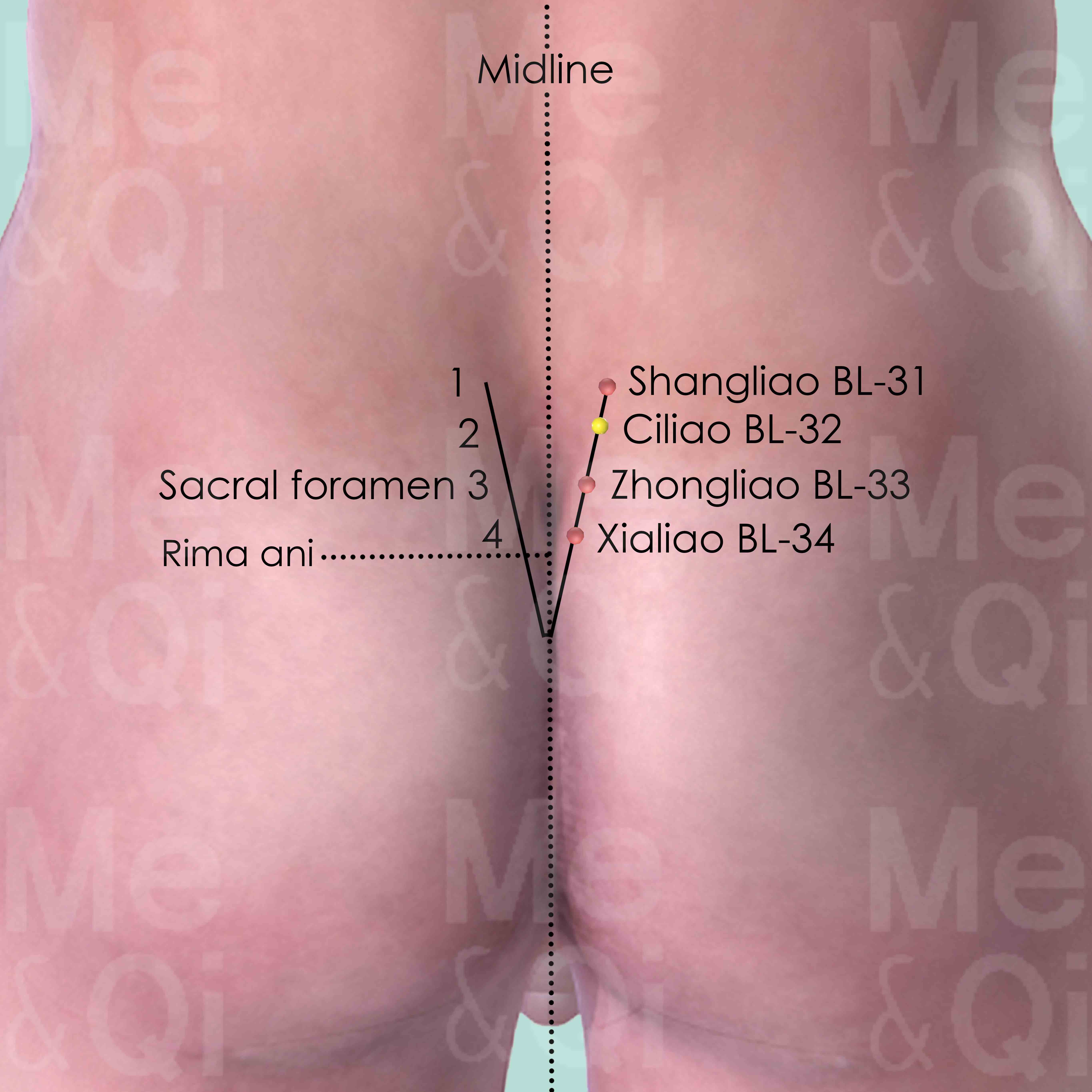
Ciliao BL-32
In the 2nd posterior sacral foramen, about midway between the posterior superior iliac spine (PSIS) and the midline.
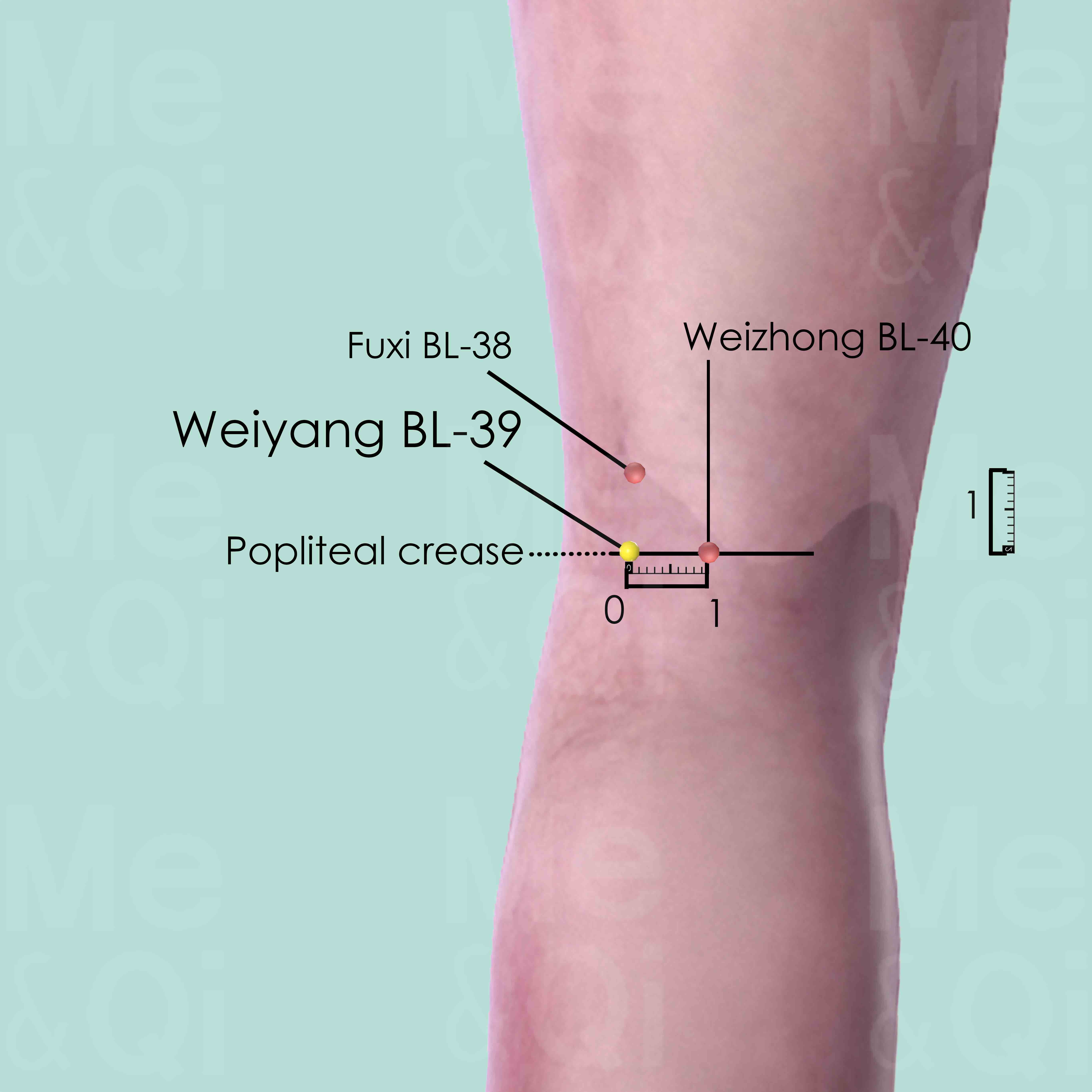
Weiyang BL-39
At the lateral end of the popliteal crease, on the medial border of the tendon of biceps femoris muscle, 1 cun lateral to Weizhong BL-40 which is the midpoint of the popliteal crease. It is also 1 cun below Fuxi BL-38.
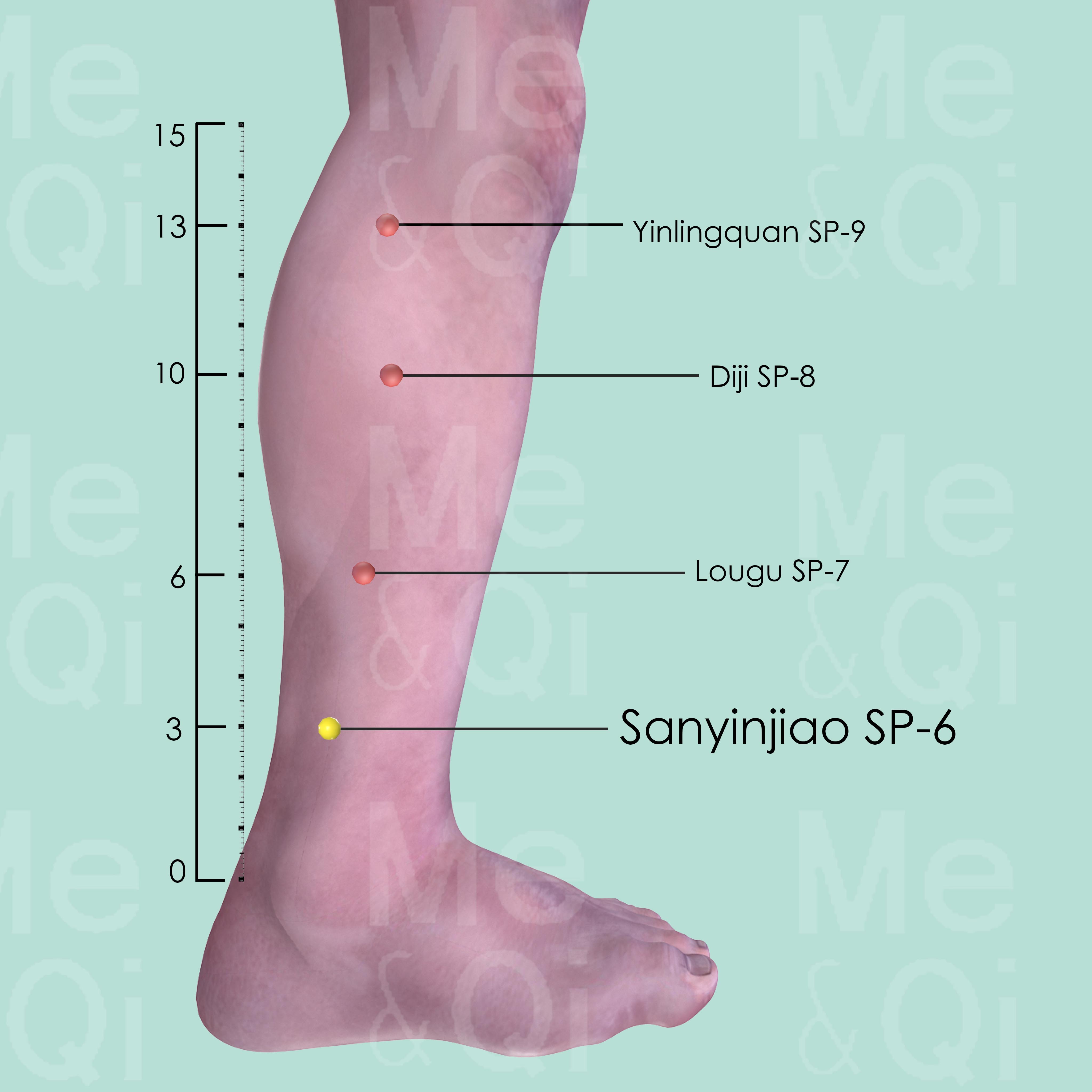
Sanyinjiao SP-6
3 cun directly above the tip of the medial malleolus, on the posterior border of the tibia, on the line drawn from the medial malleolus to Yinlingquan SP-9.
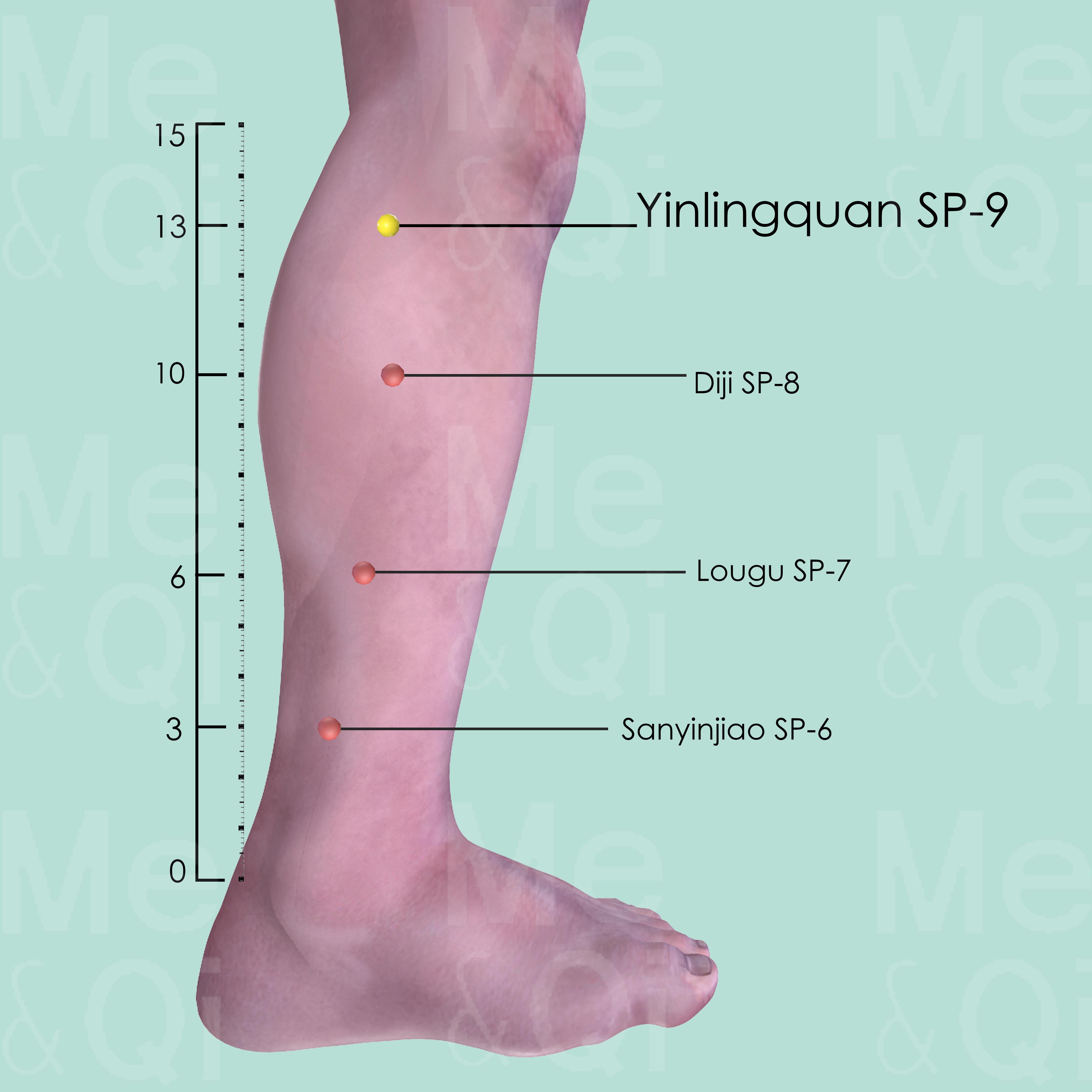
Yinlingquan SP-9
On the lower border of the medial condyle of the tibia, in the depression between the posterior border of the tibia and gastrocnemius muscle.
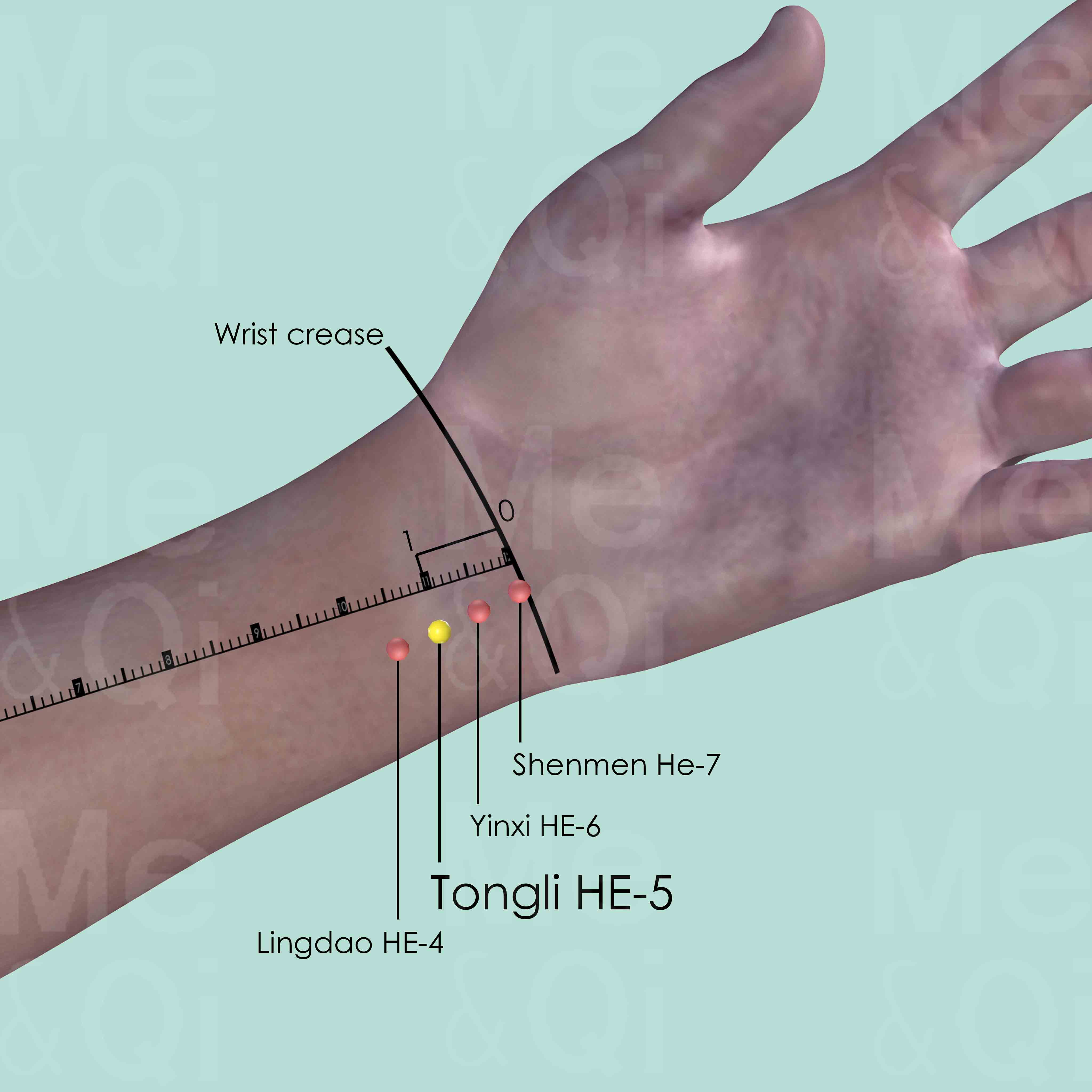
Tongli HE-5
On the radial side of the tendon of flexor carpi ulnaris muscle, 1 cun above the transverse crease of the wrist when the palm faces upward.
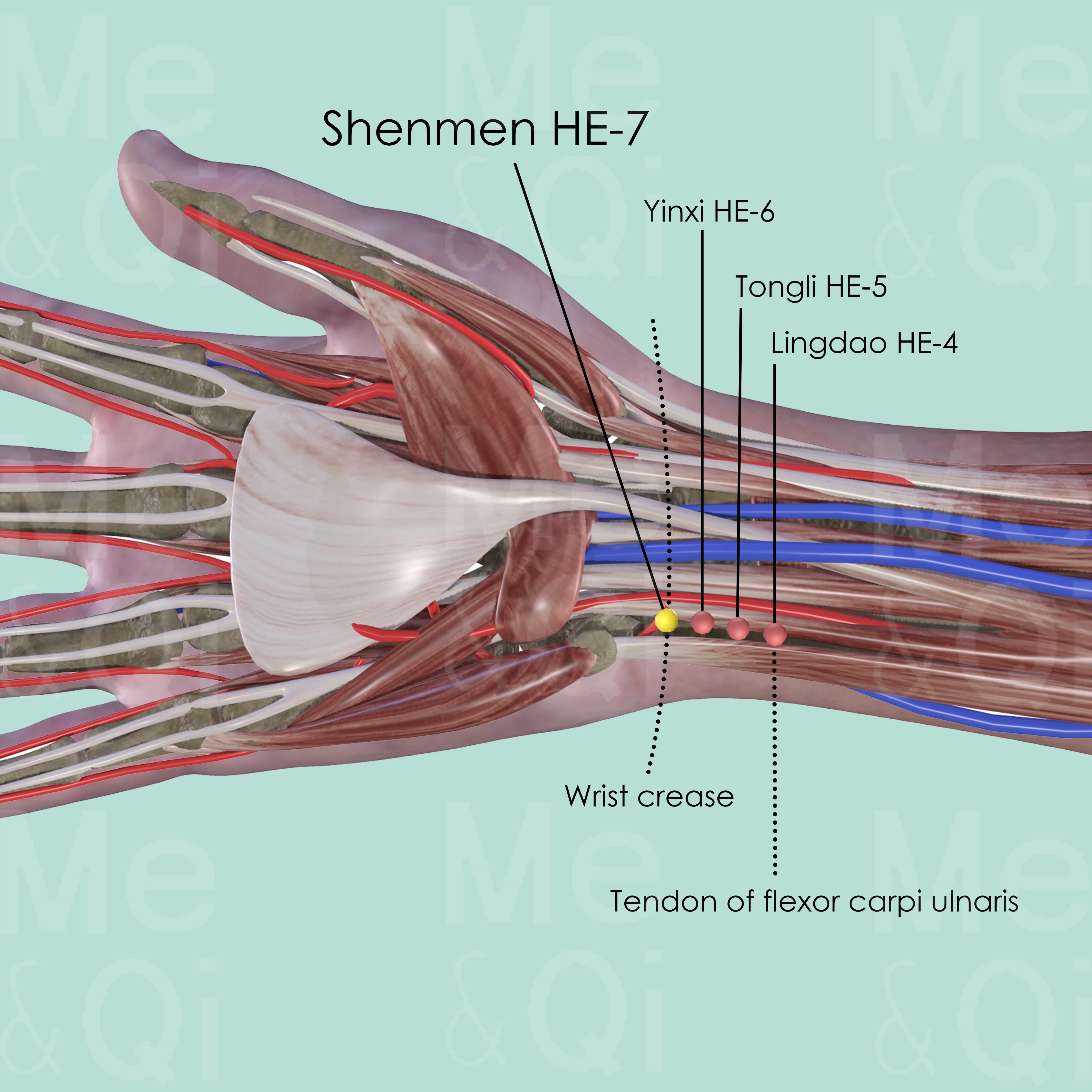
Shenmen HE-7
On the transverse crease of the wrist, in the articular region between the pisiform bone and the ulna, in the depression on the radial side of the tendon of flexor carpi ulnaris muscle.
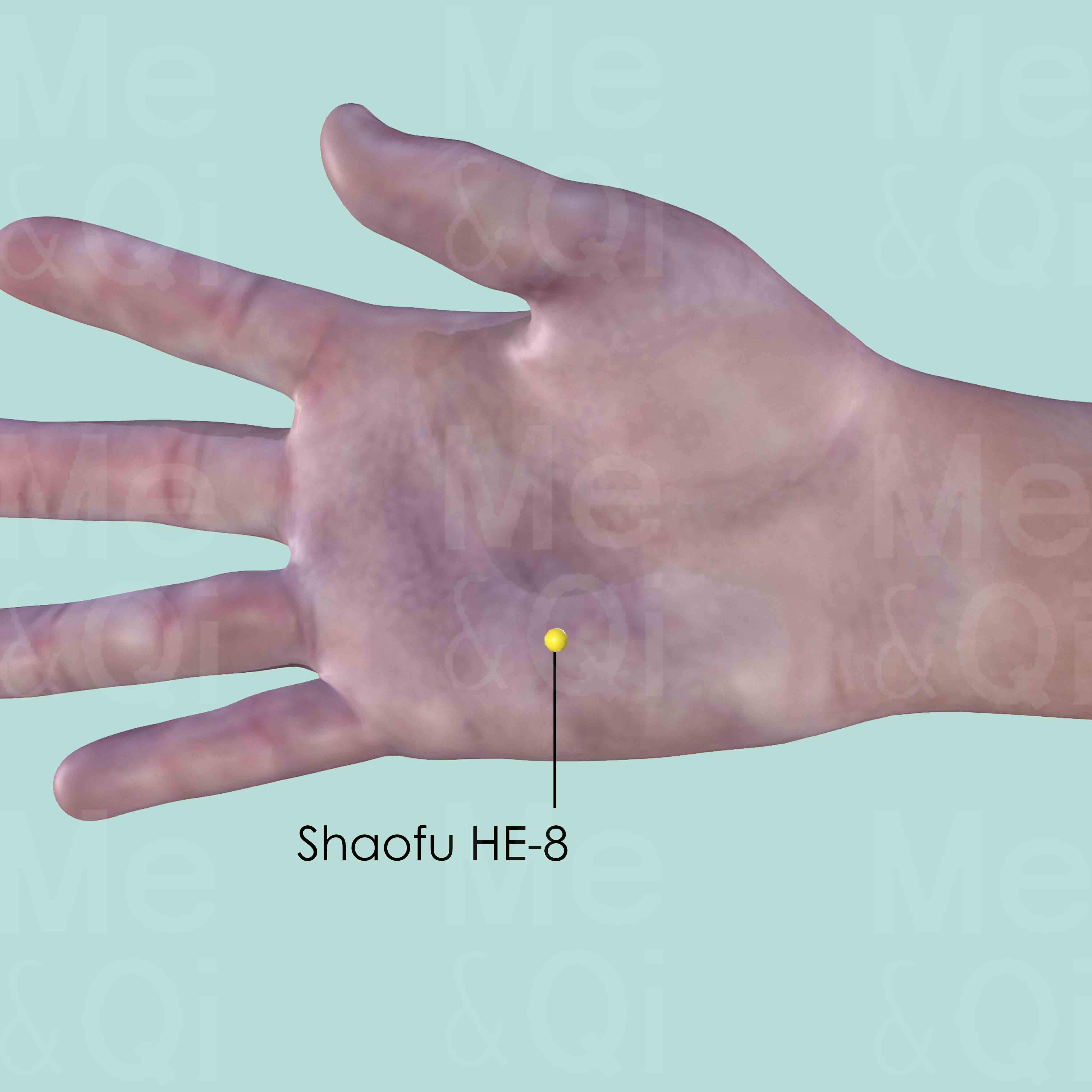
Shaofu HE-8
On the palmar surface, between the 4th and 5th metacarpal bones. When a fist is made, the point is where the tip of the little finger rests.
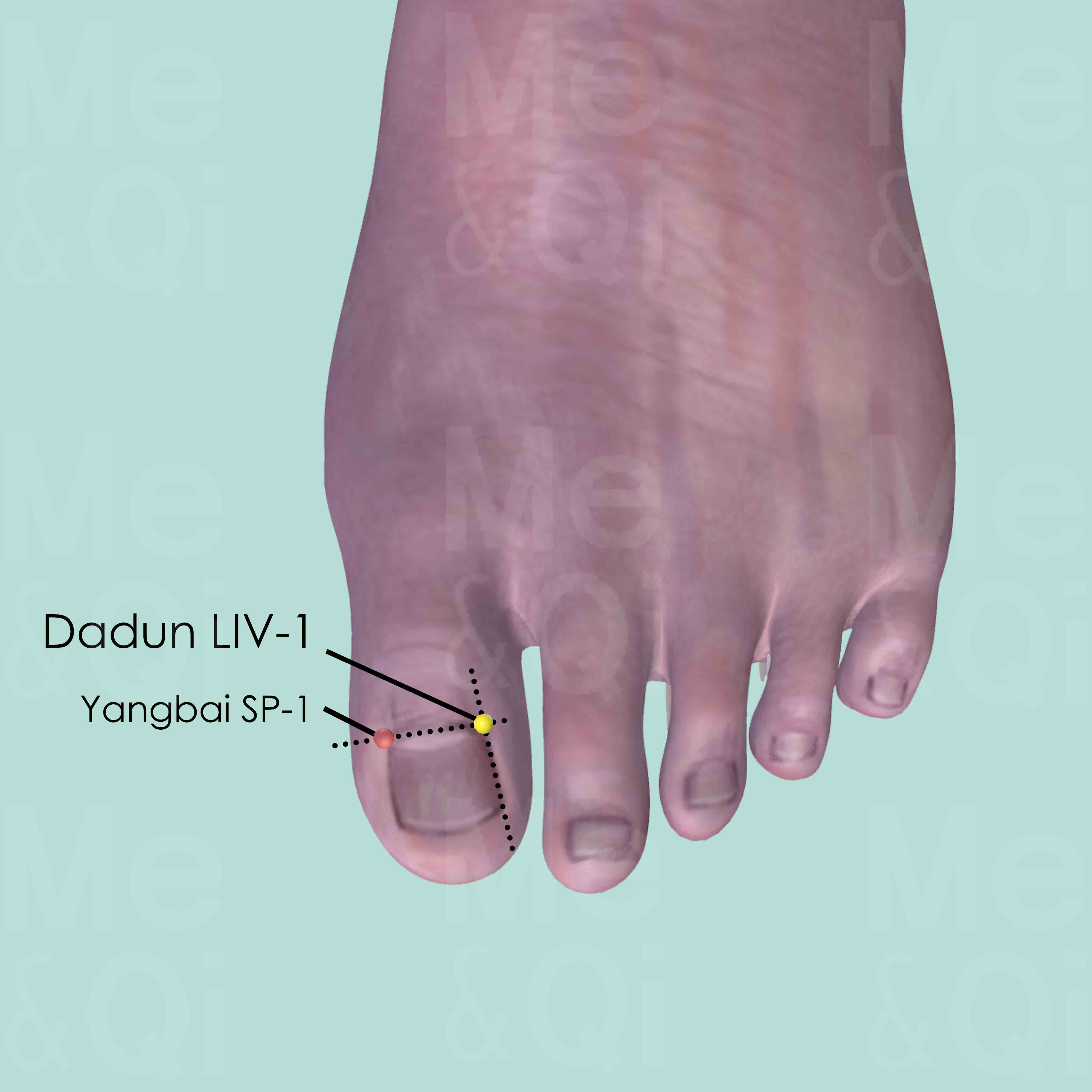
Dadun LIV-1
On the lateral side of the dorsum of the great toe terminal phalanx, between the lateral corner of the nail and interphalangeal joint.
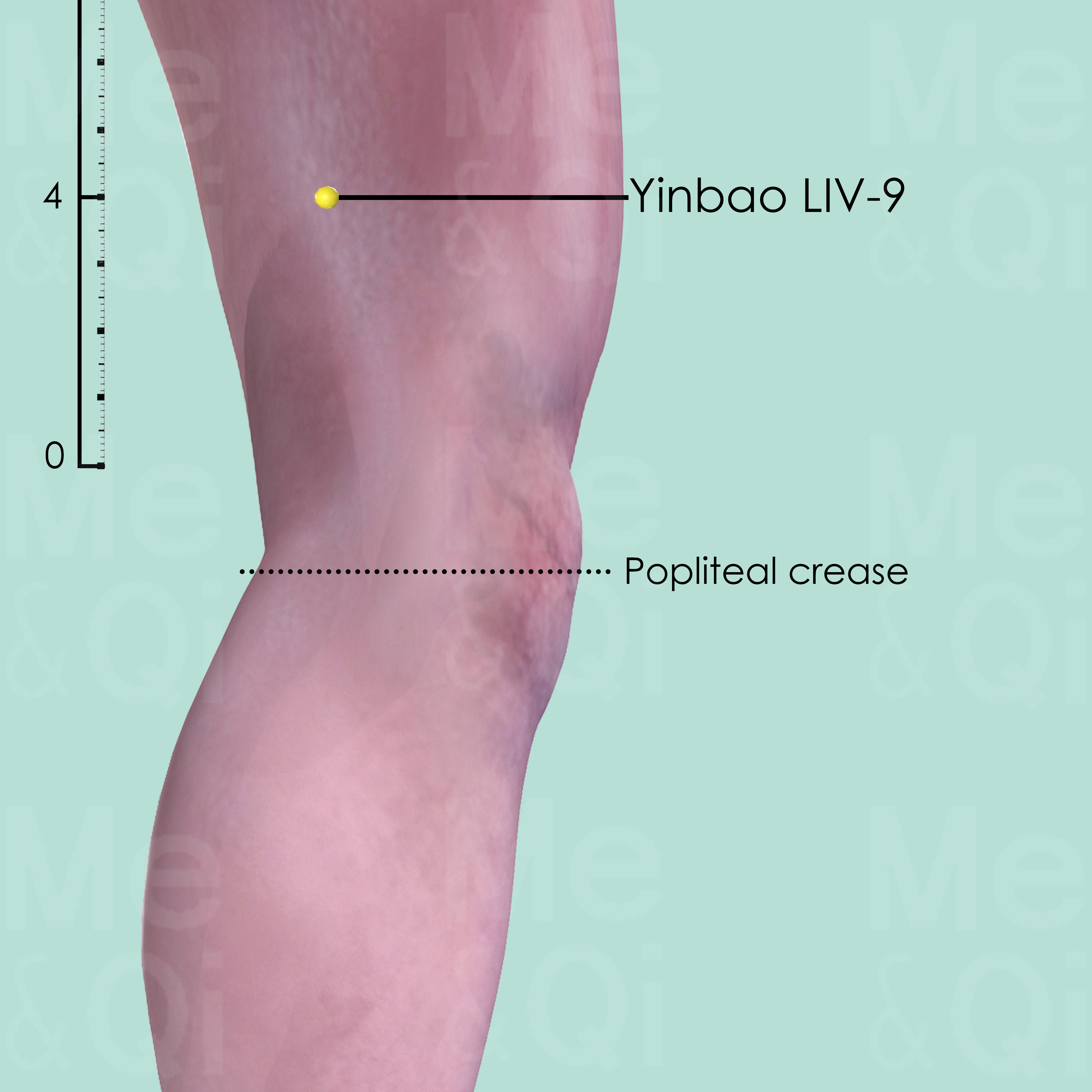
Yinbao LIV-9
4 cun above the medial epicondyle of the femur, between vastus medialis and sartorius muscle.
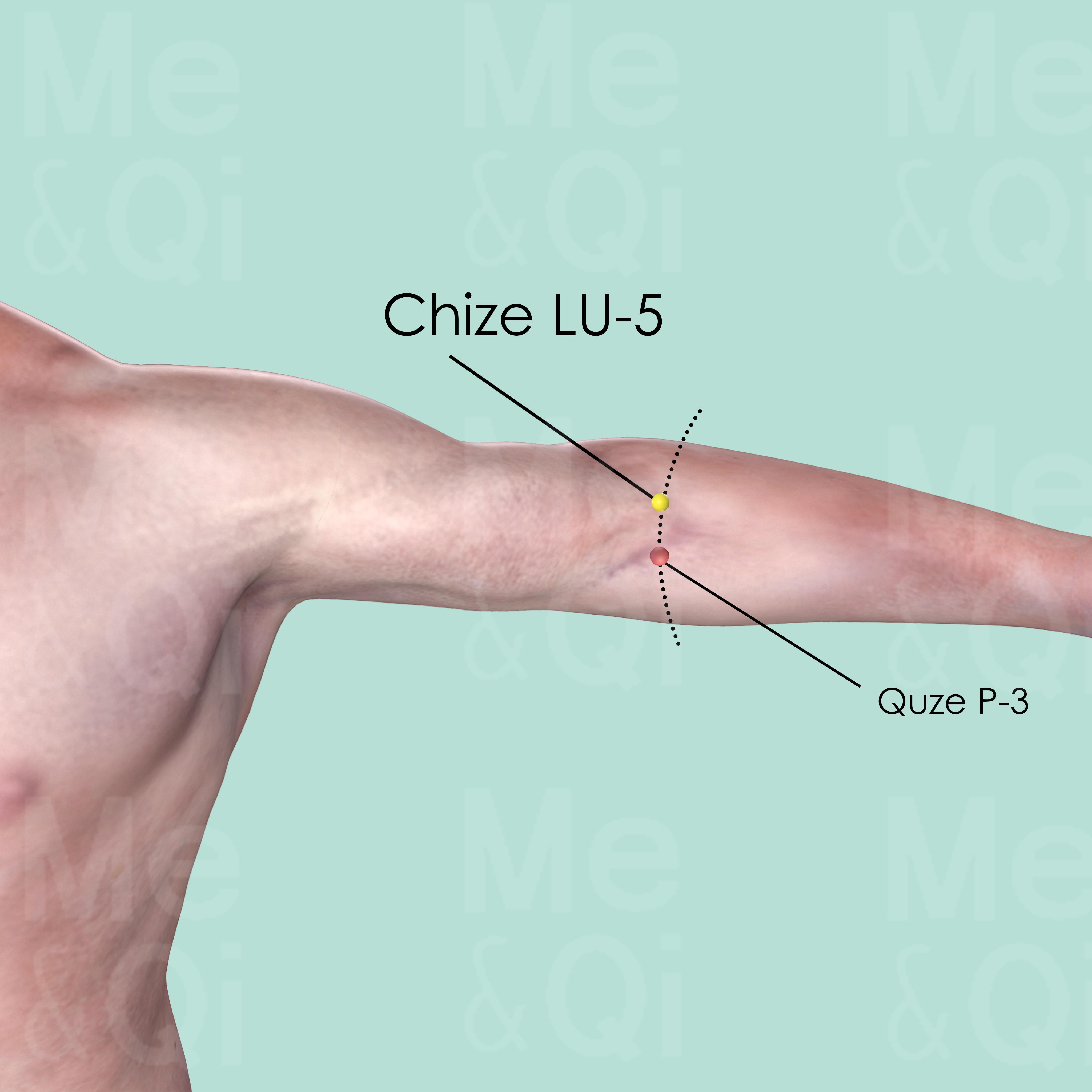
Chize LU-5
On the cubital crease, on the redial aspect of the biceps tendon. It can be easily identified when the elbow is slightly flexed.

